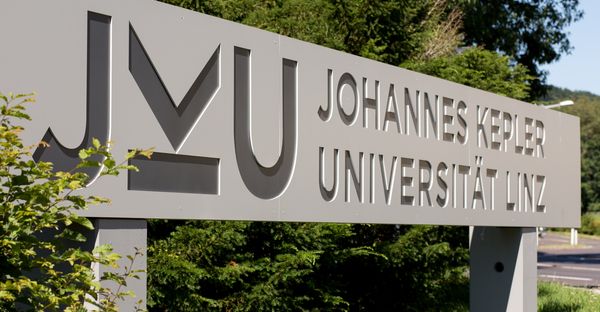Welcome to the Institute of Organization Science!
Since 1973, organizational research has had a longstanding tradition at the JKU. Internationally oriented research and education continue to shape the institute to the present day.
As part of the field of social and behavioral sciences, the Institute of Organization Science is committed to research and education focusing on ‘the organization’. This means we not only understand organizational sciences as a key area in managerial responsibility, the organization itself is also a central institution within a modern society, significantly influencing the way people live and work, particularly in a work environment.
Our research and courses focus on three key issues in today's world:
Organizing for Creativity and Innovation sheds light on the potential opportunities, requirements and constraints involved when creating something new in - more or less - organized contexts.
Organizing for Digital Transformation and Platformization examines organizational requirements and the consequences resulting from economic and social upheavals triggered by digital technologies (mobile internet, AI and sensor robotics, etc.).
Organizing for Sustainabilty and Social Change addresses issues relating to long-term viability, the quality of life and equality in the face of global and geopolitical challenges.
Since its inception, the institute has successfully collaborated with leading international universities around the world, including universities in Germany, Denmark, Italy, Great Britain, the USA, and in Canada, thereby contributing consistently to the JKU's internationalization efforts in research and academic education.
We invite you to explore our homepage to not only learn more about our academic degree programs - particularly the LIO Master's degree program and the Global Business Master's degree programs - but also our research programs.
Institute for Organization Science
Address
Johannes Kepler University Linz
Altenberger Straße 69
4040 Linz
Location
House of Schools 1, 2nd Floor, Room 02.18
Secretary: Office Hours
Monday to Thursday: 9:00 AM - 2:00 PM
Friday: 9:00 AM - 1:00 PM
News & Events
Call for Papers for the 12th Austrian/ASSIOA Early Scholars Workshop in Management
The 12th Austrian Early Scholars Workshop in Management will take place at Johannes Kepler University Linz from May 22 to May 23, 2025 (submission deadline: April 4, 2025). The event provides advanced doctoral students and early-career researchers from around the world with the opportunity to present their research in the field of management and organization and to discuss it with renowned professors from international universities.
The interactive format fosters academic exchange and the development of a global network. Key topics include institutional theory, organizational change, innovation, digital transformation, and societal challenges.
Interested participants can apply by April 4, 2025, by submitting a CV and a short research summary. Participation is free of charge, and a limited number of virtual slots are also available. More information can be found here.
David Marsden Best Paper Prize
We are excited to announce that Sara Maric, Elke Schüßler, and Laura Thäter have been awarded the David Marsden Best Paper Prize for their recent work on digital platform labor titled “Neither Employment, Nor Self-Employment”. The award-winning paper, originally submitted with empirical findings from a research project conducted by Sara Maric and Elke Schüßler and funded by the Arbeiterkammer Wien, explores the functionality of platform-mediated work systems. Recently published in the "British Journal of Industrial Relation" the paper is a theoretical exploration of digital platform work, building upon the empirical foundations established in the earlier version.
Link: https://sase.org/news/david-marsden-network-g-best-paper-award/

New Publication in the British Journal of Industrial Relations
We congratulate Sara Maric, Elke Schüßler and Laura Thäter on their recent publication in the British Journal of Industrial Relation titled “Neither Employment nor Self-Employment: Avenues Towards Functional Platform-Mediated Work Systems". Building on David Marsden’s theory of employment systems, this paper offers an employment relations perspective on platform labour. In this paper, the authors synthesize and connect insights from existing research, going beyond the prevailing debates on worker classification. Moreover, they propose an integrative framework for analyzing elements that influence platform work conditions, including transparency, control, and the potential for collective bargaining. Understanding these elements can support practitioners in trade unions and other labour organizations both, in providing the necessary assistance to platform workers, as well as shaping policy changes towards more fairness and protection for worker rights in a growing digital labour market.
It is available open access: https://lnkd.in/dGVDyctJ

Process Organization Studies (PROS) 2024 in Cyprus
From June 24 to 27, 2024 the renowned Conference on Organizational Process Research took place in Cyprus, bringing together leading process-oriented scholars from around the world. The conference, known as the "Process Organization Studies" (PROS), is dedicated to exploring organizations through the lens of process metaphysics - a worldview that sees processes rather than substances as the fundamental forms of organizing.
This year, Benjamin Schiemer presented a remarkable contribution related to a paper recently published in the journal “Organization Science”. The paper sheds light on temporal structuring in the music studio and examines how certain materially induced waiting periods influence the creative process. Schiemer's work impressively demonstrates how phases of creative production are affected by the dynamics and interruptions in the studio and how waiting can act as a catalytic factor.
The PROS conference is known for its innovative approach and its focus on the process perspective, which is based on a relational ontology, a performative epistemology, and a dynamic praxeology. It places special emphasis on becoming, change, and flow, and examines various forms of agency. The process perspective prioritizes process over outcome, activity over product, change over stability, and openness over determination. This perspective challenges us to acknowledge the complexity of the world rather than oversimplifying it.
Participation at the PROS conference provided a unique opportunity for exchange and discussion of the latest research findings and methodologies in process research.
 Go to JKU Homepage
Go to JKU Homepage



